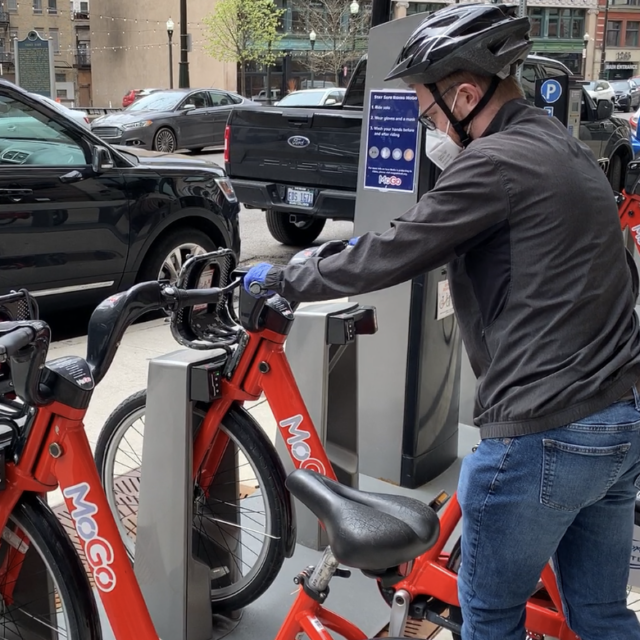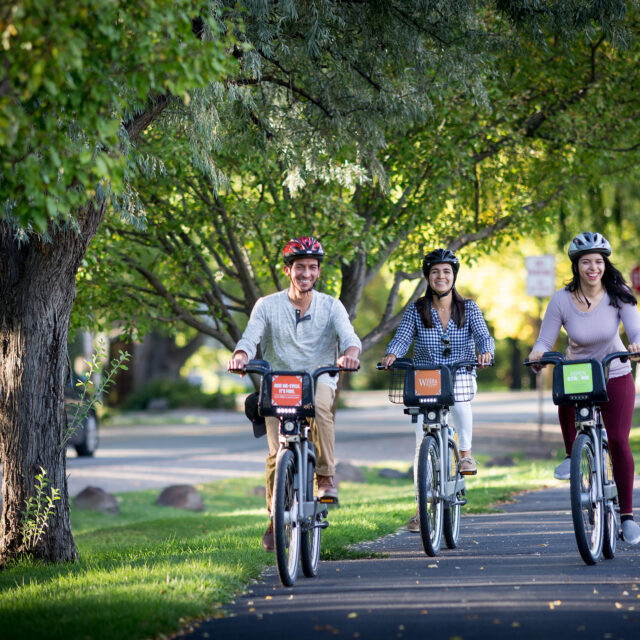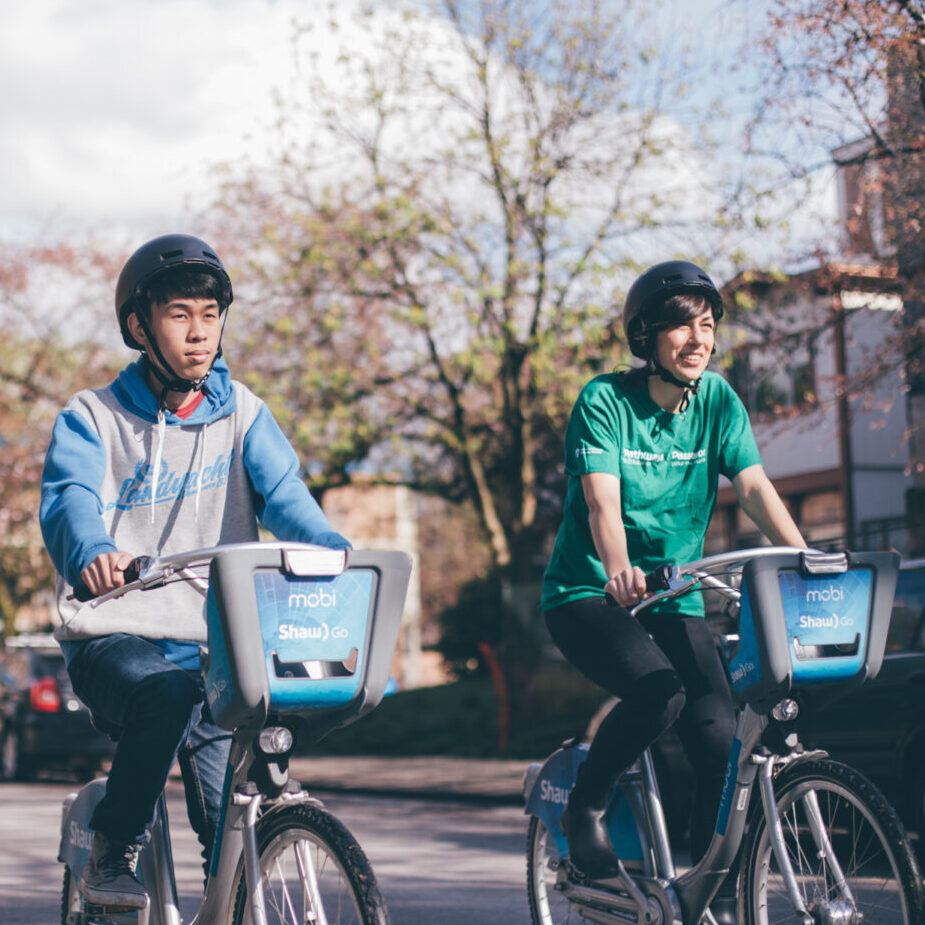Bringing Mobility to Colorado Springs’ Underserved
by Kiran Herbert, Communications Manager
February 12, 2021
Through a partnership with Springs Rescue Mission, PikeRide found new riders in the chronically homeless, addicted and poor.
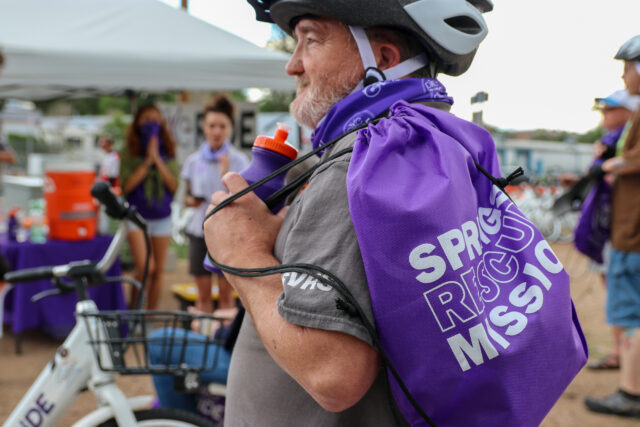
A resident of the Springs Rescue Mission wearing his new bike swag. (All photos courtesy)
When the team at PikeRide, Colorado Springs’ bike share nonprofit, decided to expand service to the Springs Rescue Mission—the city’s leading organization working to fight homelessness, poverty and addiction—they received a lot of cynical feedback.
“The comments we got were, ‘You should think of other things to do with your money than give the homeless memberships,’” says Executive Director Jolie NeSmith, “And ‘Just wait—those bikes will be gone within 24 hours.’” PikeRide didn’t listen though and Colorado Springs is the better for it. “We have not had a single issue when it comes to bikes being stolen or vandalized,” says NeSmith.
In 2019, PikeRide switched from pedal bikes to electric-assist bikes, allowing the nonprofit to expand its reach and better serve the community. The logistics of the switch were somewhat tumultuous though, and as things began to slow down, PikeRide realized that it needed to refocus on some of its original equity goals. Compared to the nation as a whole, Colorado Springs isn’t the most diverse place, despite a population of almost half a million. Still, NeSmith and her team knew that wasn’t an excuse and that they could be doing more to reach the historically underserved.
“We started asking what we could do within our service area to make an impact for people that need transportation,” says NeSmith. “We already had a relationship with Springs Rescue Mission and expanding there just made sense—it’s a population where most people don’t have cars, in a part of town where there are no grocery stores within walking distance and you have to cross a highway to get to Walmart.”
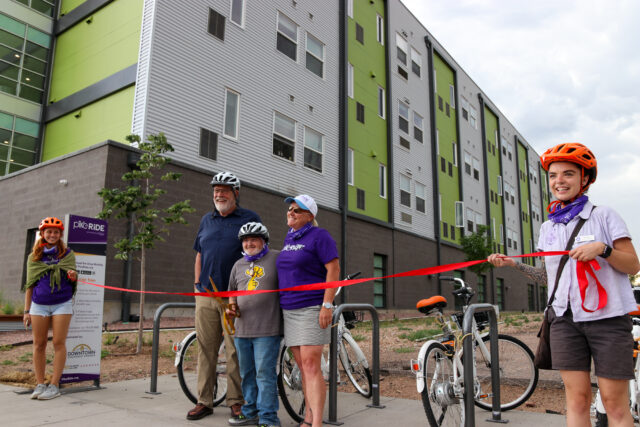
The new PikeRide station in front of Greenway Flats, the Springs Rescue Mission’s onsite housing facility for the chronically homeless.
PikeRide was able to leverage capital investment funds to build a new station in the heart of the Springs Rescue Mission with a $10,000 BBSP mini-grant for client outreach and engagement. The BBSP funding was used to provide free PikeRide memberships to residents living in Greenway Flats, the mission’s onsite housing facility for the chronically homeless, along with helmets and gear. In order to receive a free membership, residents had to attend the PikeRide School.
“Residents of the mission had a short class on bike etiquette and how to use the bikes,” says Riley Bratzler, PikeRide’s Community Outreach Manager. “We really wanted to get them mobile and autonomous.”
All other Springs Rescue Mission clients had the opportunity to receive a WeRide membership, or a discounted membership available for those experiencing financial hardship.
Despite problems posed by COVID-19—the canceling of most group rides, the Navigator route-finding class, or larger community events—PikeRide’s efforts were truly successful. Not only was the nonprofit able to get 25 Springs Rescue Mission clients registered, as well as 10 staff members, but it managed to effectively build authentic relationships with dozens more. Bratzler was also able to help clients locate safe routes over the phone and via Facebook.
PikeRide plans on continuing its mission efforts, as well as expanding to do similar work with different community partners. Going forward, they’ll draw on the following lessons learned:
- Building face-to-face relationships with clients is invaluable, as it builds trust and provides a channel for regular feedback.
- The one group ride PikeRide was able to hold was successful and brought smiles to faces, even behind masks. More should be held when possible.
- Setting up tables at the mission gave PikeRide an identity and an opportunity to speak to everyone in-person.
- Providing swag, such as helmets, water bottles filled with Gatorade, and buffs also proved super helpful when it came to engagement.
- Clients at the mission changed cell phone numbers frequently, necessitating the implementation of a system where folks could call in and update their memberships.
- Facebook is a great option for communicating with clients, especially the deaf who can’t call for assistance.
- It’s important to make sure you have good WiFi before setting up and trying to get folks registered on a bike share app.
- Having a strict schedule with this population proved difficult; communicating through community members on the ground was most useful.
To that last point, one of the biggest lessons learned was how helpful it was to have someone advocating for the nonprofit inside the Springs Rescue Mission. Darold Hibler, pictured below wearing green in the background, naturally emerged as someone PikeRide could count on to keep residents abreast of when the organization would be tabling, communicate what was working and what wasn’t, and recruit new members into the PikeRide system. Hibler’s organic leadership made him the natural choice for a part-time paid position as a PikeRide Ambassador.
“Fingers crossed—bringing him on-board is the plan,” says NeSmith. “I think we all know now that when we’re trying to look at equity in these communities, it’s better to have someone that actually lives there and is a part of it rather than us coming in as outsiders.”
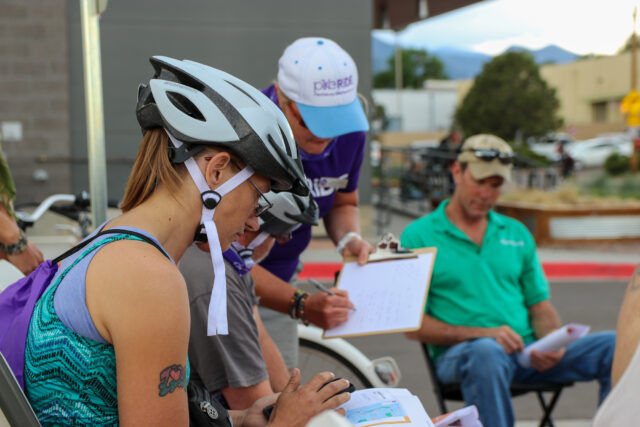
Residents at the Springs Rescue Mission learn about PikeRide.
Both Bratzler and NeSmith are confident the new PikeRide station added value for residents, other mission clients, and even mission volunteers, who now have the option of riding to campus. Larry Yonker, president and CEO of the Springs Rescue Mission, agrees. Says Yonkers, “Ninety-five percent of our residents cannot afford transportation or have conditions that would not allow them to drive, so the PikeRide school was a huge blessing.”
The Better Bike Share Partnership is funded by The JPB Foundation as a collaborative between the City of Philadelphia, theNational Association of City Transportation Officials (NACTO) and the PeopleForBikes Foundation to build equitable and replicable bike share systems. Follow us on Facebook, Twitter and Instagram or sign up for our weekly newsletter. Got a question or a story idea? Email kiran@peopleforbikes.org.

